Digital Support for Teaching Punctuation in Academic Writing in English
Abstract
Background. Academic writing skills are crucial to the enterprise of higher education, because much of the academic communication is in writing. As a rule, foreign language learners face different problems with vocabulary misuse, grammatical errors, spelling, capitalization, punctuation and some others when write academic texts in English. There are various technologies for solving these problems. One of them is digital support, because traditional types of academic writing instruction in the classroom are not always sufficient.
Purpose. The present study researches the influence of digital support on students’ knowledge and punctuation skills in academic writing in English.
Methods. The paper summarizes the results of an empirical study: training punctuation in academic writing lessons for two groups of students. The control group was applied a face-to-face and a text-book based traditional methodology. The experimental group was trained not only with a basic text-book but also with digital support. The level of knowledge and abilities in punctuation were measured with three final tests.
Results. The results obtained indicate that digital support has significant didactic potential that is why it should be applied permanently in academic writing training process.
Downloads
References
Åberg, E. S., Ståhle, Y., Engdahl, I., & Knutes-Nyqvist, H. (2016). Designing a website to support students' academic writing process. Turkish Online Journal of Educational Technology - TOJET, 15(1), 33-42.
Alharthi, S. (2021). From Instructed writing to free-writing: A study of EFL learners. SAGE Open, 1-15. DOI: https://doi.org/10.1177/21582440211007112
Ali, S. S., Amin, T., Ishtiaq, M. (2020). Punctuation errors in writing: A comparative study of students' performance from different Pakistani Universities. Sir Syed Journal of Education & Social Research, 3(1), 165-177. DOI: https://doi.org/10.36902/sjesr-vol3-iss1-2020(165-177)
Alresheedi, H. (2019). Investigating the efficacy of computer and mobile assisted vocabulary learning in developing academic writing skills with Saudi university students [Doctoral dissertation]. TEFL 5000-Dissertation. https://files.eric.ed.gov/fulltext/ED610156.pdf.
Al-Tamimi, N. (2018). An investigation of academic writing errors among tertiary level students at Hadhramout university: A perception study. Journal of Applied Linguistics and Language Research, 5(2), 214-227.
Akbulut, F. D. (2020). A bibliometric analysis of lexical bundles usage in native and non-native academic writing. Journal of Language and Linguistic Studies, 16(3), 1146-1166.
Bagiyan, A., Shiryaeva, T., Tikhonova, E., & Mekeko, N. (2021). The real value of words: how target language linguistic modelling of foreign language teaching content shapes students' professional identity. Heliyon, 7(3), e06581. DOI: https://doi.org/10.1016/j.heliyon.2021.e06581
Baranovskaya, T. A., Khorokhorina, G. A., & Son, L. P. (2021). The effect of peer assessment on the quality of written performance in Distance English Language Learning (by the example of academic writing training course in Russian university). In Proceedings of the 12th International Conference on E-Education, E-Business, E-Management, and E-Learning (pp. 105-112). DOI: https://doi.org/10.1145/3450148.3450205
Benjamin, A. (2017). Error analysis of students essays: A case of first year students of the university of health and allied sciences.International Journal of Higher Education, 6(4), 54-68.
Bezus, S., Mekeko, N., & Akbilek, E. (2021). Digital Resources for Learning and Teaching Academic Writing in English. 12th International Conference on E-Education, E-Business, E-Management, and E-Learning (pp. 53-59). IEEE. DOI: https://doi.org/10.1145/3450148.3450206
Birhan, A. T. (2021). Effects of teaching lexical bundles on EFL students' abstract genre academic writing skills improvement: Corpus-based research design.International Journal of Language Education, 5(1), 585-597. DOI: https://doi.org/10.26858/ijole.v5i1.14917
Esfandiari, R., & Barbary, F. (2017). A contrastive corpus-driven study of lexical bundles between English writers and Persian writers in psychology research articles. Journal of English for Academic Purpose, 29, 21-42. DOI: https://doi.org/10.1016/J.JEAP.2017.09.002
González, P. J. (2019). Estudio comparativo experimental entre un entorno virtual y otro presencial en una asignatura de Inglés [Experimental comparative study between a virtual environment and a face-to-face environnent in an English subject]. Porta Linguarum, 32, 119-134.
Graham, S., Harris, K., & Hebert, M. A. (2011). Informing writing: The benefits of formative assessment. A Carnegie corporation time to act report. Alliance for Excellent Education. https://media.carnegie.org/filer_public/37/b8/37b87202-7138-4ff9-90c0-cd6c6f2335bf/ccny_report_2011_informing.pdf.
Halitoglu, V. (2021). Determination of the Writing Errors of Bilingual Turkish Students in France (Example of Lyon). Participatory Educational Research, 8(4), 297-320. DOI: https://doi.org/10.17275/per.21.91.8.4
Hardman, W., & Bell, H. (2019). More fronted adverbials than ever before'. Writing feedback practices and grammatical metalanguage in an English primary school. Language and Education, 33(1), 35-50. DOI: https://doi.org/10.1080/09500782.2018.1488864
Hussain, S. S. (2019). Strategies for teaching academic writing to Saudi L2 learners. English Language Teaching, 12(12), 1-11. DOI: https://doi.org/10.5539/elt.v12n12p1
Johnson, R. B., Onwuegbuzie, A. J., & Turner, L. A. (2007). Toward a definition of mixed methods research. Journal of Mixed Methods Research, 1(2), 112-133. DOI: https://doi.org/10.1177/1558689806298224
Kwak, S. (2017). Approaches reflected in academic writing MOOCs. The International Review of Research in Open and Distributed Learning, 18(3). DOI: https://doi.org/10.19173/irrodl.v18i3.2845
Lahuerta, A. C. (2018) Study of Accuracy and Grammatical Complexity in EFL Writing.International Journal of English Studies, 18(1), 71-89. DOI: https://doi.org/10.6018/ijes/2018/1/258971
Sajid, M. & Siddiqui, A. (2015). Lack of academic writing skills in English language at higher education level in Pakistan: Causes, effects and remedies.International Journal of Language and Linguistics, 2(4), 174-186.
Schcolnik, M. (2018). Digital tools in academic writing. Journal of Academic Writing, 8(1), 121-130. DOI: https://doi.org/10.18552/joaw.v8i1.360
Strobla, C., Ailhaudb, E., Benetosc, K., Devittd, A., Krusee, O., Proskef, A., & Rapp, C. (2019). Digital support for academic writing: A review of technologies and pedagogies.Computers & Education, 131, 33-48. DOI: https://doi.org/10.1145/3450148.3450206
Tavşanlı, Ö. F., & Kara Ü. E. (2021). The effect of a peer and self-assessment-based editorial study on students' ability to follow spelling rules and use punctuation marks correctly. Participatory Educational Research (PER), 8(3), 268-284. DOI: https://doi.org/10.17275/per.21.65.8.3
Thewissen, J. (2013). Capturing L2 accuracy developmental patterns: Insights from an error-tagged EFL learner corpus. The Modern Language Journal, 97, 77-101.
Tusting, K., McCulloch, S., Bhatt, I., Hamilton, M., & Barton, D. (2019). Academic writing. The dynamics of knowledge creation. London: Routledge. DOI: https://doi.org/10.4324/9780429197994
Williams, J. A. (2001). Classroom conversations: Opportunities to learn for ESL students in mainstream classrooms. Embracing Pluralism Worldwide, 54(8), 750-757. https://www.jstor.org/stable/20204989.
Copyright (c) 2022 National Research University Higher School of Economics

This work is licensed under a Creative Commons Attribution 4.0 International License.
Authors who publish with this journal agree to the Copyright Notice.



